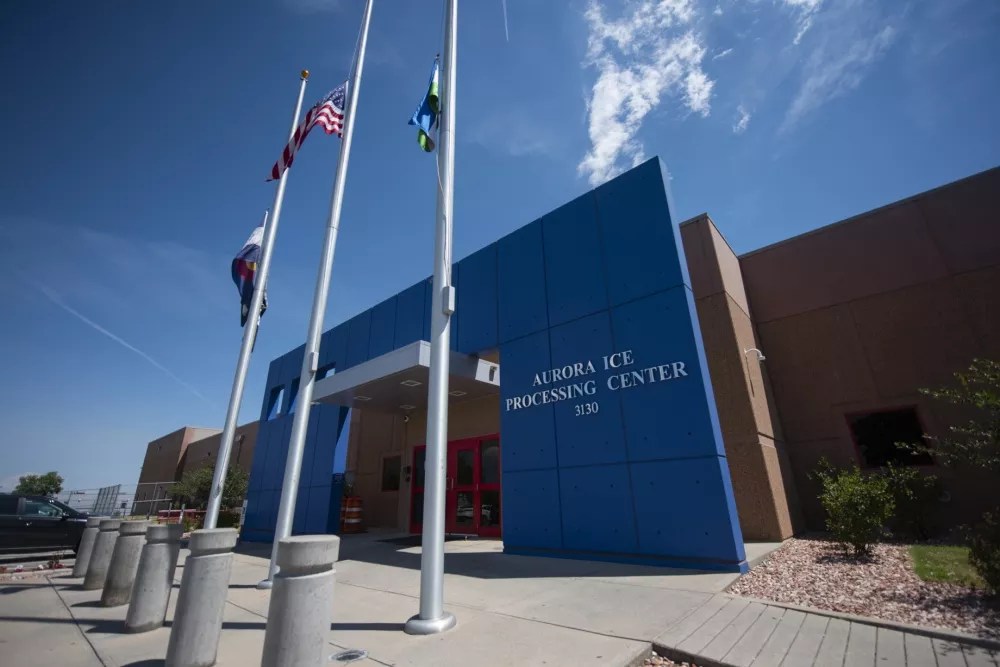
Immigration and Customs Enforcement

Audio By Carbonatix
“Immigration court is the only legal proceeding in the U.S. where somebody can be detained without a lawyer,” says Raquel Lane-Arellano, policy manager at the Colorado Immigrant Rights Coalition. Citing the staggering number of indigent immigrants in civil detention in this state who wind up in deportation court without an attorney, Lane-Arellano and other advocates are now pushing for lawmakers to create a statewide fund that would pay for their legal representation.
“This is a moment when immigrant families are facing compounding effects of a global pandemic, extreme economic hardship and, on top of that, are excluded from most types of relief,” Lane-Arellano adds. “Those Colorado families are then being asked to fund and face the impossibly challenging immigration court alone.”
Over the last five fiscal years, 69 percent of the individuals detained at the Aurora Contract Detention Facility, which is run by private prison company GEO Group through a contract with Immigration and Customs Enforcement, have gone through court proceedings without a lawyer, according to the Vera Institute of Justice, which advocates for increased representation of immigrants in civil detention. While defendants in all criminal proceedings, whether citizens or not, are guaranteed a right to counsel, those detained by the federal government for immigration violations have no such right. And in extremely complicated immigration cases, legal representation can be key.
“Many, many people who end up winning the right to remain in the U.S. with representation would have otherwise been deported without representation,” says Nina Siulc, research director at the Center on Immigration and Justice at the Vera Institute of Justice.
Since 2001, just 2 percent of those detained at the Aurora ICE facility who went to court without a lawyer had successful outcomes in their cases. Meanwhile, 28 percent of those detainees represented by legal counsel were victorious and able to stay in the United States.
“It is materially unfair – and, of course, what makes it even more unfair is that most of the people who are in proceedings are people who have been here for a very long time,” says Siulc. “It’s not just removing somebody. It’s about the instability it’s causing their household and whole social network.”
In 2018, the City of Denver established a fund to provide lawyers to immigrants with cases on both the detained and non-detained court dockets in Denver and Aurora. The next year, money from that fund paid for lawyers with the Rocky Mountain Immigrant Advocacy Network representing 42 Denver residents going through detained immigration proceedings.
“It’s been a merits-blind representation system,” explains Mekela Goehring, executive director of RMIAN. “This is truly a universal representation model. This is the gold standard for anyone who cares about social justice and fundamental fairness before immigration court.”
Two RMIAN lawyers who specialize in detained cases have been covered by Denver’s fund; so far, they’ve secured release or relief from deportation for about 20 percent of their defendants, with many cases still pending. Goehring calls this rate a “phenomenal success.”
But the fund only goes so far. “There’s still not enough legal capacity to represent every Denver resident,” says Goehring. In fact, in 2019, 80 percent of those in the Aurora detention facility who were eligible to be represented did not have lawyers, because RMIAN couldn’t handle more cases.
While places like Aurora and Fort Collins are considering establishing their own funds, advocates say that won’t be enough. That’s why CIRC and other advocacy groups hope to see a fund based on the Denver model established at the state level, and point to a Vera Institute of Justice survey showing that Coloradans would get behind its creation. “Eighty-five percent of people in Colorado support government-funded attorneys for everyone, including people in immigration court,” notes a description of the survey results. “Even among people who oppose immigration to the United States, 69 percent support the government funding attorneys for all, including people in immigration court.”
New York’s taxpayer-funded immigrant legal defense fund is the gold standard, according to Siulc. In 2020, New York state lawmakers allocated $10 million for that fund, which helps both detained and non-detained individuals fight deportation. Like Denver, New York City has its own fund, too.
But will elected officials will get behind such a fund in 2021? After all, they’ll already have to balance a budget decimated by the COVID-19 economic downturn.
Adrienne Benavidez, a Democrat state representative from Adams County who has often sponsored bills that support immigrant rights, isn’t sure there will be enough political will for this type of bill next year. “I’m on board with the idea behind it. I support Denver’s initiative, and I think there’s an absolute need for people to have their representation,” says Benavidez. “I think that the biggest obstacle to it is where would the money come from. We’re looking at things we’re probably going to have to cut now. Starting new programs, new expenditures is a really, really difficult sell in our legislature.”
The numbers behind such a fund haven’t been fully crunched yet; the Colorado Fiscal Institute will release its assessment in the next month or so.
But advocates already believe that Governor Jared Polis, whose office declined to comment on the proposal, has their back. “We met with the governor’s office several times last session, and they seemed to be in support of the fund,” says Lane-Arellano.
Adds Goehring, “My sense is that the governor’s office would be a champion of a statewide legal defense bill, as well as leaders at the Colorado legislature.”
Concludes Siulc: “Investment in deportation defense should not be seen as taking money away from another vulnerable group, but it’s part of expanding the safety net of people who are vulnerable.”